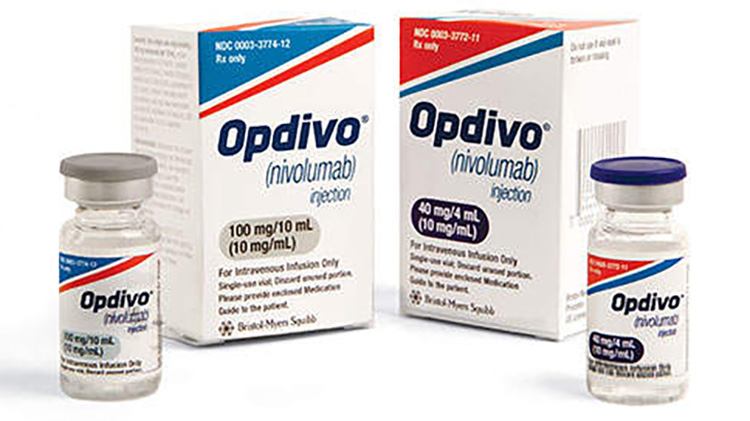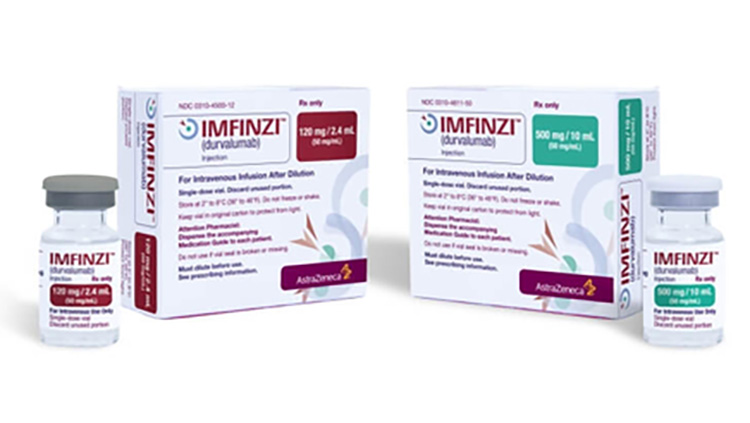Opdivo (Nivolumab) vs Imfinzi (durvalumab)
Opdivo (Nivolumab) vs Imfinzi (durvalumab)
Opdivo (nivolumab) and Imfinzi (durvalumab) are both immune checkpoint inhibitors, but they target different proteins; nivolumab blocks PD-1, a protein on T cells, while durvalumab blocks PD-L1, a protein often found on cancer cells. The choice between these medications can depend on the specific type of cancer being treated, as nivolumab is approved for a variety of cancers including melanoma, lung cancer, and kidney cancer, while durvalumab is primarily used in the treatment of urothelial carcinoma and stage III non-small cell lung cancer after chemoradiation. A healthcare provider will consider factors such as the patient's specific cancer type, stage, previous treatments, and overall health before recommending the most appropriate treatment option.
Difference between Opdivo and Imfinzi
| Metric | Opdivo (Nivolumab) | Imfinzi (durvalumab) |
|---|---|---|
| Generic name | Nivolumab | Durvalumab |
| Indications | Metastatic melanoma, non-small cell lung cancer, renal cell carcinoma, classical Hodgkin lymphoma, squamous cell carcinoma of the head and neck, urothelial carcinoma, colorectal cancer, hepatocellular carcinoma, esophageal cancer | Urothelial carcinoma, non-small cell lung cancer, extensive-stage small cell lung cancer |
| Mechanism of action | PD-1 immune checkpoint inhibitor that blocks the interaction between PD-1 and its ligands, PD-L1 and PD-L2 | PD-L1 immune checkpoint inhibitor that blocks the interaction between PD-L1 and PD-1, CD80 |
| Brand names | Opdivo | Imfinzi |
| Administrative route | Intravenous infusion | Intravenous infusion |
| Side effects | Fatigue, rash, musculoskeletal pain, pruritus, diarrhea, nausea, weakness, upper respiratory tract infection, cough, difficulty breathing, decreased appetite, back pain, joint pain, fever | Fatigue, musculoskeletal pain, constipation, decreased appetite, nausea, peripheral edema, urinary tract infection, fever, rash, dyspnea, cough |
| Contraindications | Severe hypersensitivity to nivolumab or any of its excipients | Severe hypersensitivity to durvalumab or any of its excipients |
| Drug class | Monoclonal antibody, immune checkpoint inhibitor | Monoclonal antibody, immune checkpoint inhibitor |
| Manufacturer | Bristol-Myers Squibb | AstraZeneca |
Efficacy
Efficacy of Opdivo (Nivolumab) in Lung Cancer Treatment
Opdivo (nivolumab) is a programmed death-1 (PD-1) immune checkpoint inhibitor that is designed to harness the body’s own immune system to help restore anti-tumor immune response. In the treatment of lung cancer, particularly non-small cell lung cancer (NSCLC), nivolumab has shown significant efficacy. It has been approved for patients with metastatic NSCLC whose cancer has progressed during or after platinum-based chemotherapy. Clinical trials have demonstrated that nivolumab can lead to improved survival rates compared to traditional chemotherapy, with some patients experiencing long-term benefits and a reduction in tumor burden. The efficacy of nivolumab can vary based on several factors, including the PD-L1 expression level of the tumor and previous treatments the patient has received.
Efficacy of Imfinzi (Durvalumab) in Lung Cancer Treatment
Imfinzi (durvalumab) is another PD-L1 inhibitor that has been shown to be effective in the treatment of lung cancer. It is particularly used in the treatment of unresectable, Stage III NSCLC after the completion of chemoradiotherapy. Durvalumab works by blocking the interaction of PD-L1 with PD-1 and CD80, countering the tumor's immune-evading tactics. The PACIFIC trial, a pivotal phase III clinical trial, demonstrated that durvalumab significantly improved median progression-free survival compared with placebo, establishing it as a standard treatment option for patients with Stage III NSCLC who do not have disease progression after concurrent chemoradiotherapy.
Comparative Efficacy in Lung Cancer
When comparing the efficacy of Opdivo and Imfinzi in lung cancer, it is important to consider the specific context of their use. Both drugs have been shown to be effective in improving survival in NSCLC, but they are approved for use at different stages of the disease and may be used in different treatment regimens. Nivolumab has a broader range of approval for NSCLC, including second-line treatment for metastatic disease, while durvalumab is specifically indicated for Stage III disease after chemoradiotherapy. The choice between these immunotherapies can depend on factors such as the patient's overall health, the stage of lung cancer, and prior treatments.
Conclusion
In conclusion, both Opdivo (nivolumab) and Imfinzi (durvalumab) have brought significant advancements in the treatment of lung cancer, offering hope for improved outcomes for patients. While their mechanisms of action are similar, they are used in different stages of lung cancer treatment and have unique profiles of efficacy and indications. Ongoing research and clinical trials continue to refine the use of these immunotherapies, potentially expanding their indications and improving patient care in lung cancer treatment.
Regulatory Agency Approvals
Opdivo
-
European Medical Agency (EMA), European Union

-
Food and Drug Administration (FDA), USA

-
Health Canada

-
Pharmaceuticals and Medical Devices Agency (PMDA), Japan

-
Therapeutic Goods Administration (TGA), Australia

-
Medsafe (NZ)

Imfinzi
-
European Medical Agency (EMA), European Union

-
Food and Drug Administration (FDA), USA

-
Health Canada

-
Therapeutic Goods Administration (TGA), Australia

-
Medsafe (NZ)

Access Opdivo or Imfinzi today
If Opdivo or Imfinzi are not approved or available in your country (e.g. due to supply issues), you can access them via Everyone.org.
How it works

Make an enquiry
Choose the medicine you want to buy, answer a couple of questions, and upload your prescription to speed things up. We’ll get back to you within 24 hours.


Make an enquiry
Choose the medicine you want to buy, answer a couple of questions, and upload your prescription to speed things up. We’ll get back to you within 24 hours.


Breeze through the paperwork
We'll guide you through the required documents for importing unapproved medicine, ensuring you have all the necessary information.


Get a personalized quote
We’ll prepare a quote for you, including medicine costs and any shipping, administrative, or import fees that may apply.


Receive your medicine
Accept the quote and we’ll handle the rest - sourcing and safely delivering your medicine.

Some text on this page has been automatically generated. Speak to your physician before you start a new treatment or medication.
Let's talk
If you have any questions, call us or send us a message through WhatsApp or email:
Contact us




